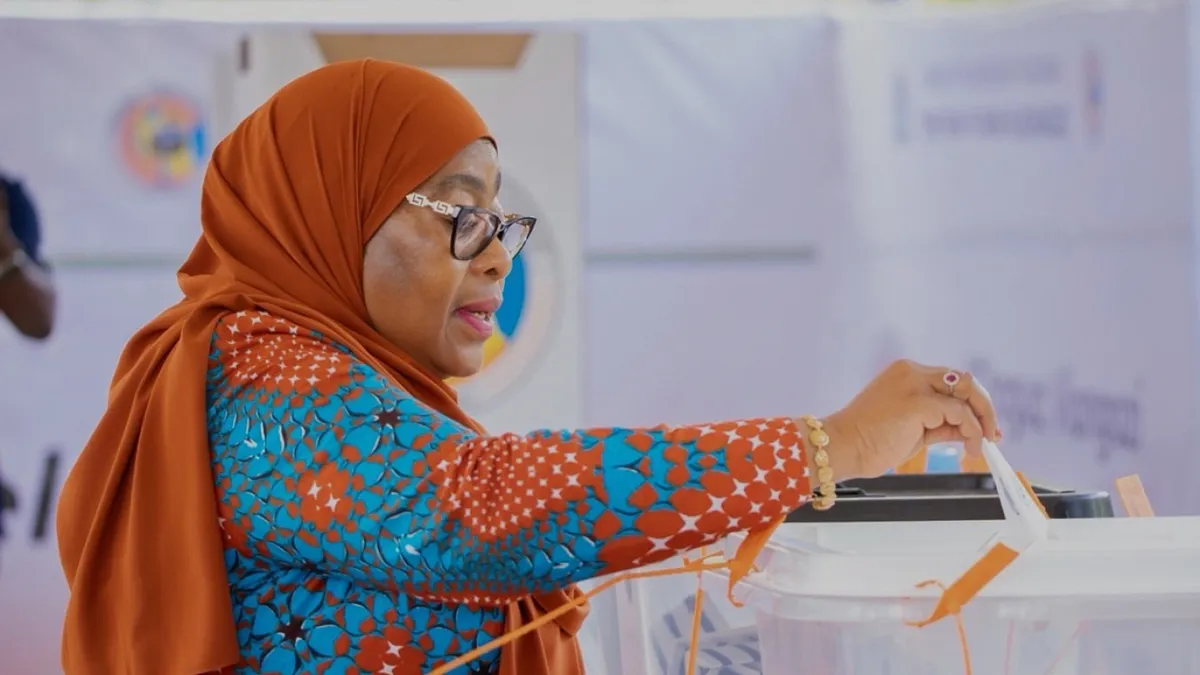
KAMPALA, Uganda — In a historic and controversial election, Tanzanian President Samia Suluhu Hassan secured a staggering 97% of the vote, according to official results announced early Saturday. This remarkable achievement marks a rare landslide victory in the region. Hassan received the winner's certificate during an event in the administrative capital, Dodoma, where she emphasized that the results reflected the overwhelming support of Tanzanians for a female leader.
In her post-election remarks, Hassan stated, "After the election, it's time to unite our country and not destroy what we've built over more than six decades." She pledged to take all necessary actions, involving security agencies, to ensure peace in Tanzania following the election.
President Hassan ascended to power in 2021 when she was elevated from her position as vice president after the death of her predecessor, John Pombe Magufuli, who passed away shortly after the beginning of his second term. However, the election outcome has raised significant concerns among critics and opposition groups, many of whom argue that the election was not a genuine democratic contest but rather a coronation of Hassan, particularly as her main rivals were barred from running.
Hassan faced 16 candidates from smaller parties during the election held on October 29. Unfortunately, the election was marred by violence, with protests erupting in major cities as demonstrators sought to halt the counting of votes. In response, the military was deployed alongside police forces to manage the unrest. Internet connectivity issues further complicated the situation, disrupting travel and daily life across the East African nation.
The protests intensified across Tanzania, leading the government to postpone the reopening of universities that were scheduled for November 3. On Saturday, a tense calm enveloped the streets of Dar es Salaam, Tanzania's commercial capital, where security forces were stationed at roadblocks, scrutinizing the identity cards of individuals venturing out.
Tanzanian authorities have not disclosed the number of casualties resulting from the violence. However, Seif Magango, a spokesperson for the U.N. human rights office, reported credible information indicating that at least 10 deaths occurred in Dar es Salaam, along with casualties in Shinyanga and Morogoro towns. U.N. Secretary-General Antonio Guterres expressed concern over the situation, urging all parties to prevent further violence.
The foreign ministers of the U.K., Canada, and Norway issued a joint statement highlighting credible reports of numerous fatalities and significant injuries arising from the government's response to the protests. Additionally, Tundu Lissu, the leader of the opposition Chadema party, remains imprisoned on treason charges after advocating for electoral reforms deemed essential for free and fair elections.
Another prominent opposition figure, Luhaga Mpina of the ACT-Wazalendo group, was barred from participating in the election. The ruling party, Chama Cha Mapinduzi (CCM), faced the challenge of maintaining its decades-long grip on power amidst the rise of charismatic opposition figures advocating for political change.
A landslide victory of this magnitude is unprecedented in the region, with only Paul Kagame, the authoritarian leader of Rwanda, frequently achieving similar results. Rights organizations, including Amnesty International, have reported a concerning pattern of enforced disappearances, arbitrary arrests, and extrajudicial killings in Tanzania leading up to the election. In June, a U.N. panel of human rights experts documented over 200 cases of enforced disappearances since 2019, expressing alarm over the repression surrounding the electoral process.
Hassan's administration has been criticized for its crackdown on political opponents, with the International Crisis Group noting the government's efforts to curtail freedom of expression. This includes a ban on the social media platform X and restrictions on the Tanzanian digital platform JamiiForums, aimed at silencing dissenting voices through intimidation and arrests.
The political maneuvering observed in Tanzania is striking, especially in a country where single-party rule has dominated since the adoption of multi-party politics in 1992. Critics argue that while previous leaders maintained a semblance of tolerance toward opposition, Hassan's leadership style is characterized as authoritarian, contrasting sharply with the youth-led democracy movements flourishing in other regions.
The CCM party, which has maintained ties with the Communist Party of China, has governed Tanzania since its independence from Britain in 1961. Hassan's victory continues this legacy, as the CCM remains intricately linked with state mechanisms, effectively controlling the security apparatus and ensuring a structured emergence of new leaders every five to ten years. This orderly transition has long bolstered Tanzania's reputation as a bastion of political stability and relative peace, especially among rural voters who continue to support the ruling party.